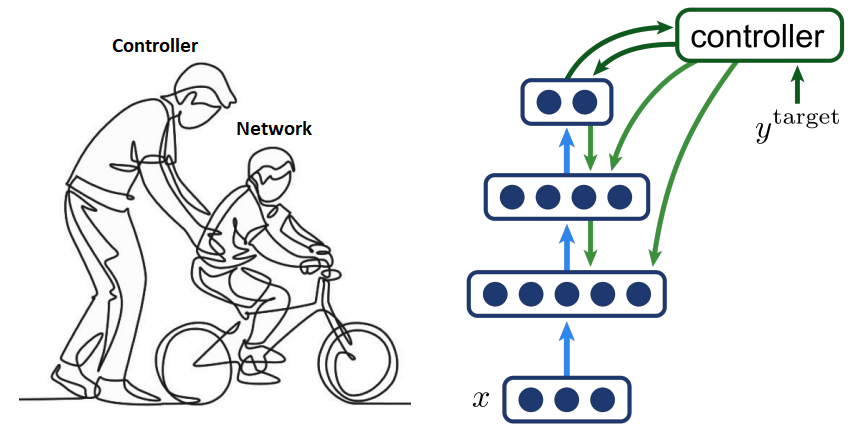MSc thesis project proposal
[2023] A hardware architecture based on the least-control principle for bio-plausible local online learning
How does the brain modify its synapses to improve behavior? This question, known as credit assignment, bears key importance as current training algorithms for artificial neural networks, such as the error backpropagation algorithm, are known to be biologically implausible [1]. Indeed, error backpropagation requires information that is not available locally in space and time and relies on separate inference and learning phases, while the brain is known to rely on single-phase local learning rules. Interestingly, biological implausibility is often tied to hardware inefficiency [2]: exploring solutions to the former is thus likely to lead to innovation in the latter.
An emerging neural network training framework, known as the least-control principle (LCP), approximates error backpropagation by minimizing the amount of feedback applied by a controller that pushess the network activity toward a desired output [3]. This new framework is able to release the main bio-plausibility issues of standard error backpropagation, thereby forming an interesting candidate for efficient hardware implementations.
The goal of this project is to investigate a hardware implementation of LCP, and possibly its implementation for spiking neural networks with continuous-time dynamics, in digital and/or mixed-signal hardware.
[1] T. P. Lillicrap et al., "Backpropagation and the brain," Nature Reviews Neuroscience vol. 21, no. 6, pp. 335-346, 2020.
[2] C. Frenkel, D. Bol and G. Indiveri, "Bottom-up and top-down neural processing systems design: Neuromorphic intelligence as the convergence of natural and artificial intelligence," arXiv preprint arXiv:2106.01288, 2021.
[3] A. Meulemans et al., "The least-control principle for learning at equilibrium," NeurIPS, 2022.
Requirements
For this multi-disciplinary project, background in machine learning and digital design is required.
Background in mixed-signal design is a plus.
Previous experience with neuromorphic architectures is not expected.
This project will be in collaboration with Dr. João Sacramento at ETH Zürich and will be coupled with a 15-ECTS internship there.
Interested students should send a motivation letter together with their CV (incl. course transcripts and grades) to Dr. Charlotte Frenkel at c.frenkel@tudelft.nl
More MSc proposals for Dr. Charlotte Frenkel will appear in the coming weeks, interested students are encouraged to reach out by e-mail to enquire about upcoming projects.
Contact
dr. Charlotte Frenkel
Electronic Instrumentation Group
Department of Microelectronics
Last modified: 2023-12-02
